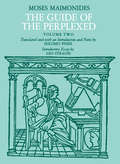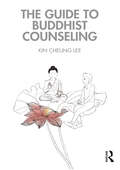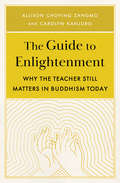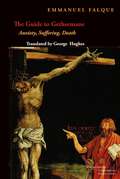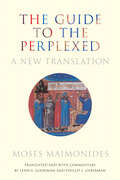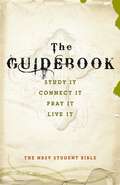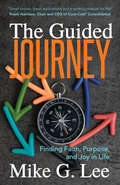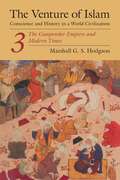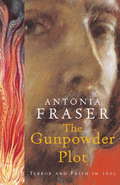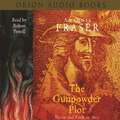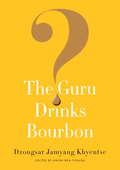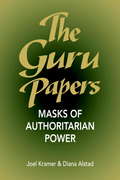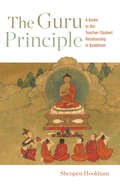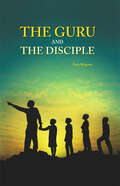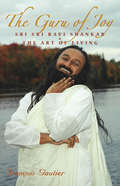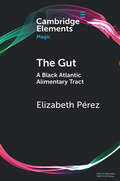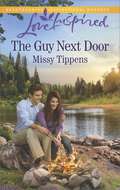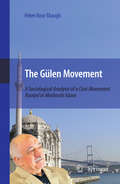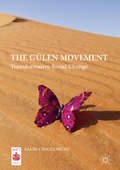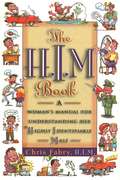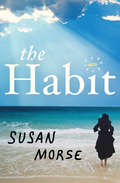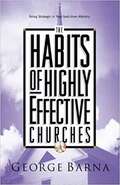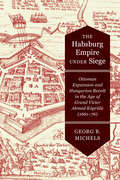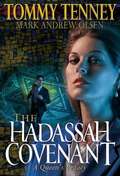- Table View
- List View
The Guide of the Perplexed, Volume 2
by Moses MaimonidesThis monument of rabbinical exegesis written at the end of the twelfth century has exerted an immense and continuing influence upon Jewish thought. Its aim is to liberate people from the tormenting perplexities arising from their understanding of the Bible according only to its literal meaning. This edition contains extensive introductions by Shlomo Pines and Leo Strauss, a leading authority on Maimonides.
The Guide to Buddhist Counseling
by Kin Cheung LeeBuddhist concepts and practices have become increasingly popular and integrated into professional psychology. This book is the first to propose a theoretical orientation for counseling based on Early Buddhist teaching, and introduce it to counseling professionals for use in mental health treatment and practice. Lee begins his book by outlining the essential concepts required to understand the Buddhist view of human nature and the world. He presents the Buddhist counseling model and suggests practices for the spiritual advancement of counselors, including self-cultivation plans, contemplative exercises, and different types of meditation. Lastly, he discusses how to apply the model in assessment, conceptualization, and intervention, and uses several case examples to illustrate the actual process. As a go-to book in Buddhist counseling, this book is a valuable resource for Buddhist chaplains, counselors, and mental health professionals interested in using Buddhism in their clinical practice, as well as graduate students in religious studies and counseling.
The Guide to Enlightenment: Why the Teacher Still Matters in Buddhism Today
by Allison Choying Zangmo Carolyn KanjuroNavigate the transformative potential of the student-teacher relationship with advice and personal stories from two female Buddhist teachers with decades of experience working with spiritual guides.Taking a spiritual path that genuinely transforms our lives is no easy task. It engages the deepest parts of ourselves, and there are many pitfalls and ravines that can carry us away on this sometimes treacherous path. A spiritual guide who is genuine and experienced is vital for navigating such obstacles--someone to give perspective, someone to trust, someone to light the way. The teacher-student relationship has been a core part of Buddhism from the time of the Buddha and his first disciples over 2,500 years ago, and it continues to be central to navigating a spiritual path of meditation and reflection. In this intimate collection of personal stories and advice, Allison Choying Zangmo and Carolyn Kanjuro team up to reflect on their experiences as longtime practitioners of Buddhism, their own unique relationships with their partners who are also their spiritual guides, and to celebrate and uphold the transformative power of the student-teacher relationship. As both students and leaders in their Buddhist communities, Allison and Carolyn share insights into how we can successfully interpret traditional Buddhist understandings of spiritual mentorship for today&’s world. From guidance on how to find a teacher to how to face issues of miscommunication and confrontation, Kanjuro and Zangmo help readers consider their own goals and emotional boundaries as a starting point for building a positive new spiritual connection.
The Guide to Gethsemane: Anxiety, Suffering, Death (Perspectives in Continental Philosophy)
by Emmanuel FalqueAnxiety, suffering and death are not simply the “ills” of our society, nor are they uniquely the product of a sick and sinful humanity. We must all some day confront them, and we continually face their implications long before we do. In that sense, the Garden of Gethsemane is not merely a garden “outside the walls” of Jerusalem but also the essential horizon for all of us, whether we are believers or not.Emmanuel Falque explores, with no small measure of doubt, Heidegger’s famous statement that by virtue of Christianity’s claims of salvation and the afterlife, its believers cannot authentically experience anxiety in the face of death. In this theological development of the Passion, already widely debated upon its publication in French, Falque places a radical emphasis on the physicality and corporeality of Christ’s suffering and death, marking the continuities between Christ’s Passion and our own orientation to the mortality of our bodies. Beginning with an elaborate reading of the divine and human bodies whose suffering is masterfully depicted in the Isenheim Altarpiece, and written in the wake of the death of a close friend, Falques’s study is both theologically rigorous and marked by deeply human concerns.Falque is at unusual pains to elaborate the question of death in terms not merely of faith, but of a “credible Christianity” that remains meaningful to non-Christians, holding, with Maurice Blondel, that “the important thing is not to address believers but to say something which counts in the eyes of unbelievers.” His account is therefore as much a work of philosophy as of theology—and of philosophy explicated not through abstractions but through familiar and ordinary experience. Theology’s task, for Falque, is to understand that human problems of the meaning of existence apply even to Christ, at least insofar as he lives in and shares our finitude. In Falque’s remarkable account, Christ takes upon himself the burden of suffering finitude, so that he can undertake a passage through it, or a transformation of it.This book, a key text from one the most remarkable of a younger generation of philosophers and theologians, will be widely read and debated by all who hold that theology and philosophy has the most to offer when it eschews easy answers and takes seriously our most anguishing human experiences.
The Guide to the Perplexed: A New Translation
by Moses MaimonidesA landmark new translation of the most significant text in medieval Jewish thought. Written in Arabic and completed around 1190, the Guide to the Perplexed is among the most powerful and influential living texts in Jewish philosophy, a masterwork navigating the straits between religion and science, logic and revelation. The author, Rabbi Moses ben Maimon, commonly known as Maimonides or as Rambam, was a Sephardi Jewish philosopher, jurist, and physician. He wrote his Guide in the form of a letter to a disciple. But the perplexity it aimed to cure might strike anyone who sought to square logic, mathematics, and the sciences with biblical and rabbinic traditions. In this new translation by philosopher Lenn E. Goodman and historian Phillip I. Lieberman, Maimonides' warm, conversational voice and clear explanatory language come through as never before in English. Maimonides knew well the challenges facing serious inquirers at the confluence of the two great streams of thought and learning that Arabic writers labeled 'aql and naql, reason and tradition. The aim of the Guide, he wrote, is to probe the mysteries of physics and metaphysics. But mysteries, to Maimonides, were not conundrums to be celebrated for their obscurity. They were problems to be solved. Maimonides' methods and insights resonate throughout the work of later Jewish thinkers, rationalists, and mystics, and in the work of philosophers like Thomas Aquinas, Spinoza, Leibniz, and Newton. The Guide continues to inspire inquiry, discovery, and vigorous debate among philosophers, theologians, and lay readers today. Goodman and Lieberman's extensive and detailed commentary provides readers with historical context and philosophical enlightenment, giving generous access to the nuances, complexities, and profundities of what is widely agreed to be the most significant textual monument of medieval Jewish thought, a work that still offers a key to those who hope to harmonize religious commitments and scientific understanding.
The Guidebook: The NRSV Student Bible
by Harper BiblesThe Guidebook is the first student Bible developed especially for mainline and progressive evangelicals, offering a host of exercises and background material that will enable students to understand what is really in the Bible and how to live out its message. Rather than attempting to entertain teens with relevant, hip sidebars that merely serve as distractions, The Guidebook, based on The New Revised Standard Edition currently used in Protestant churches, will help evangelical teenagers engage more deeply with God’s Word and apply it to real life situations. For young students and parents of Bible students seeking a more meaningful way to connect with scripture in their daily lives, The Guidebook is the new standard for today’s youth.
The Guided Journey: Finding Faith, Purpose, and Joy in Life
by Mike G. LeeFor those who feel frustrated, bored, or unfulfilled, The Guided Journey reveals how to let go of engineering this life to discover the true, individual purpose they were created for.The majority of people today admit hating their job. Even as the United States experiences the lowest unemployment rate in modern history, people struggle to find a career and job satisfaction. Rather than encouraging those experiencing this frustration to continue running away from the problem, business consultant Mike Lee reveals a proven, ten-step process for people to discover their God-given purpose and set a new course for their life. With transparency about Mike&’s own unexpected twists and turns, The Guided Journey includes true stories from Mike&’s life at each step, explaining the struggles of trying to juggle and balance life as a husband, father of three, consultant, entrepreneur, and a person of faith. Mike walks with readers through these steps to show them how they can also refocus their vision and priorities for both career and family life while rediscovering meaning and joy along the way.
The Gujarat Carnage
by Asghar Ali EngineerIn February 2002, 59 Hindu pilgrims were burnt alive in a rail coach at Godhra. The National Human Rights Commission investigated the episode. This is a compilation of reports, surveys, and other significant material on the carnage.
The Gunpowder Empires and Modern Times: The Gunpowder Empires And Modern Times (The Venture of Islam: Conscience and History in a World Civilization)
by Marshall G.S. HodgsonThe Venture of Islam has been honored as a magisterial work of the mind since its publication in early 1975. In this three-volume study, illustrated with charts and maps, Hodgson traces and interprets the historical development of Islamic civilization from before the birth of Muhammad to the middle of the twentieth century. This work grew out of the famous course on Islamic civilization that Hodgson created and taught for many years at the University of Chicago. In this concluding volume of The Venture of Islam, Hodgson describes the second flowering of Islam: the Safavi, Timuri, and Ottoman empires. The final part of the volume analyzes the widespread Islamic heritage in today's world. "This is a nonpareil work, not only because of its command of its subject but also because it demonstrates how, ideally, history should be written."—The New Yorker
The Gunpowder Plot: Terror And Faith In 1605
by Lady Antonia FraserRemember, remember, the Fifth of November ... With a narrative that grips the reader like a detective story, Antonia Fraser brings the characters and events of the Gunpowder Plot to life. Dramatically recreating the conditions and motives that surrounded the fateful night of 5 November 1605, she unravels the tangled web of religion and politics that spawned the plot.'An excellent book which unravels the whole story of the plot' Literary Review'Told with impressive scholarship and panache ... with a sense of pace and tension worthy of a John le Carré novel' Sunday Telegraph
The Gunpowder Plot: Terror And Faith In 1605
by Lady Antonia FraserWith a narrative that grips the reader like a detective story, Antonia Fraser brings the characters and events of the Gunpowder Plot to life. Dramatically recreating the conditions and motives that surrounded the fateful night of 5 November 1605, she unravels the tangled web of religion and politics that spawned the plot."Told with impressive scholarship and panache... The result is a narrative that is clear, balanced, and builds to its denouement with a sense of pace and tension worthy of a John le Carr novel" John Adamson, Sunday TelegraphRead by Robert Powell(p) 2003 Orion Publishing Group
The Guru Drinks Bourbon?
by Dzongsar Jamyang KhyentseDevotion to one’s teacher is the lifeblood of the Vajrayana path. Because the guru can and will use whatever means it takes to wake us up, this relationship may require us to drop our most deeply held beliefs and expectations. Dzongsar Jamyang Khyentse addresses some of the most misunderstood aspects of this powerful relationship and gives practical advice on making the most of this precious opportunity for transformation. Through stories and classical examples, he shows how to walk the path with eyes wide open, with critical-thinking skills sharpened and equipped to analyze the guru, before taking the leap.
The Guru Papers: Masks of Authoritarian Power
by Joel Kramer Diana AlstadThe Guru Papers demonstrates with uncompromising clarity that authoritarian control, which once held societies together, is now at the core of personal, social, and planetary problems, and thus a key factor in social disintegration. It illustrates how authoritarianism is embedded in the way people think, hiding in culture, values, daily life, and in the very morality people try to live by. The book unmasks authoritarianism in such areas as relationships, cults, 12-step groups, religion, and contemporary morality. Chapters on addiction and love show the insidious nature of authoritarian values and ideologies in the most intimate corners of life, offering new frameworks for understanding why people get addicted and why intimacy is laden with conflict. By exposing the inner authoritarian that people use to control themselves and others, the authors show why people give up their power, and how others get and maintain it.
The Guru Principle: A Guide to the Teacher-Student Relationship in Buddhism
by Shenpen HookhamA clear-headed and relatable guidebook for navigating the student-teacher relationship by one of the first female Buddhist teachers in the West.All major forms of Buddhism stress the need for a teacher. However, the importance of having a guide or guru is sometimes a source of cultural and spiritual confusion as Buddhism expands in the West. A clear understanding of the Buddhist view of the guru is essential for the student-teacher relationship to be beneficial for one's spiritual growth.Collecting over fifty years of personal experiences as both a student and a teacher, Shenpen Hookham writes candidly of the opportunities and challenges facing modern Dharma students in the West who wish to study with a teacher. Traditional texts often do not reflect how the student-teacher relationship manifests in practice, which leaves many pressing questions and a great deal of confusion in communities taking root in the West. With honesty and clarity, Hookham discusses the roles of the teacher, practices related to the guru, and commonly asked questions she receives as a teacher. This handbook is the first of its kind, breaking down in a pragmatic and relatable way everything you need to know to enter a student-teacher relationship with open eyes and an open heart.
The Guru and the Disciple
by Dada BhagwanAmong the myriad of relationships in life, the one between a Guru and disciple is most sacred and unique.In the book “Guru and Disciple”, Gnani Purush (embodiment of Self knowledge) Dada Bhagwan provides insight into the nature of the Guru-disciple relationship and offers in-depth answers to questions like: “What are definitions of Guru, and disciple? How is a Guru necessary in spiritual transformation?” “How does a spiritual Guru differ from a spiritual teacher, a spiritual advisor, or from spiritual people in general?” “How do I find a Guru with the spiritual power to grant me spiritual enlightenment required in a spiritual life?” “Among the many spiritual teachers accessible today, do I need to find a Guru with a certain level of spiritual development or spiritual awareness?” For those on a spiritual quest, seeking spiritual growth, or simply desirous of spiritual guidance, this book provides an invaluable resource among the spiritual books available on the Guru-disciple.
The Guru of Joy: Sri Sri Ravi Shankar & Die Kunst Des Lebens. Mit Einem Vorwort Des Dalai Lama
by François GautierThis is the authorized biography of one of the most magnetic men in the world. He is a man whose presence and grace have touched and transformed millions of followers all over the world-from Bangalore to Bosnia, Surinam to South Africa, Tamil Nadu to Trinidad. A tireless traveler, he has addressed the United Nations, the World Economic Forum, and bright young minds at Harvard University. In a world torn with strife, he has carried the eternal message of love and revival of human values. Wherever he goes, people from all walks of life-homemakers, chiefs of industry, politicians, and film stars-seek his blessings and advice. Amazingly, he manages to make each one feel special and cherished. Who is this playfully profound, childlike, ever-smiling guru whose avowed mission is to "put a smile on the face of every person he meets"? He is Sri Sri Ravi Shankar, the founder of the international Art of Living Foundation, with centers in more than 140 countries of the world. This book offers you hitherto-unpublished material about his childhood, his adolescence, his spiritual development, his organization, and his Healing Breath Workshop. He has devised the Sudershan Kriya, a transformative process that has miraculous healing powers. This is a man who practices no religion but teaches, through example, the meaning if true spirituality: being ever-joyful!
The Gut: A Black Atlantic Alimentary Tract (Elements in Magic)
by Elizabeth PérezIf the head is religion, the gut is magic. Taking up this provocation, this Element delves into the digestive system within transnational Afro-Diasporic religions such as Haitian Vodou, Brazilian Candomblé, and Cuban Lucumí (also called Santería). It draws from the ethnographic and archival record to probe the abdomen as a vital zone of sensory perception, amplified in countless divination verses, myths, rituals, and recipes for ethnomedical remedies. Provincializing the brain as only one locus of reason, it seeks to expand the notion of 'mind' and expose the anti-Blackness that still prevents Black Atlantic knowledges from being accepted as such. The Element examines gut feelings, knowledge, and beings in the belly; African precedents for the Afro-Diasporic gut-brain axis; post-sacrificial offerings in racist fantasy and everyday reality; and the strong stomachs and intestinal fortitude of religious ancestors. It concludes with a reflection on kinship and the spilling of guts in kitchenspaces.
The Guy Next Door
by Missy TippensFrom Friend to...Fiancé? Stalwart and steady, Darcy O'Malley has been by Luke Jordan's side since childhood. She has seen him through trials and tragedies, romances and breakups. They've been everything to each other-except boyfriend and girlfriend. Why ruin a good thing? What Luke can't explain, however, is why suddenly Darcy's presence is making his heart beat so hard. Something has changed since he left Appleton, and it's making him uneasy. Is it possible his best friend is meant to be something more? Dare he risk their perfect friendship in the hopes of finding his perfect wife?Stalwart and steady, Darcy O'Malley has been by Luke Jordan's side since childhood. She has seen him through trials and tragedies, romances and breakups. They've been everything to each other-except boyfriend and girlfriend. Why ruin a good thing? What Luke can't explain, however, is why suddenly Darcy's presence is making his heart beat so hard. Something has changed since he left Appleton, and it's making him uneasy. Is it possible his best friend is meant to be something more? Dare he risk their perfect friendship in the hopes of finding his perfect wife?
The Gülen Movement
by Helen Rose EbaughThis is a book about an Islamic movement, the Gülen Movement, that is rooted in a moderate version of Islam and that promotes interfaith and intercultural dialog and global peace. Based on interviews with supporters of the movement in Turkey and in the U.S. and visits to Gülen-inspired schools, hospitals, newspapers and relief organizations, the book describes a movement that has millions of supporters in Turkey and that has spread to over 100 countries on five continents.
The Gülen Movement: Transformative Social Change (Middle East Today)
by Salih CıngıllıoğluThis book presents findings from research into one of the world's most influential Islamic movements, the Gülen Movement, from the perspective of social transformation through adult education. At the core of research questions lies how the movement enrolls volunteers from all walks of life and transforms them to adopt its aims at the expense of their individual ideals. The book reveals the socio-psychological mechanisms that make such transformation possible by looking at how followers integrate weekly lectures and discussions on the theory and practice of Islam into their personal and social lives. The Gülen Movement offers a moderate interpretation of Islam and stresses the vitality of establishing communication with the members of all faiths. This book provides a window into how and why religion may roll into extremism by presenting findings from an opposite perspective: the participants in the research all define themselves as truly pious but do not even imply an act of violence in tens of hours of interviews. In short, the book weaves the strands of "Islamic," "movement," and "adult education" into a unified whole and limns the snapshot of a social movement, offering a comprehensive discussion of the role of adult education within the movement, as well as its transformative potential and its wider social and political implications.
The H.I.M. Book: A Woman's Manual for Understanding Her Highly Identifiable Male
by Christopher H. FabryChances are, your husband or boyfriend (also known as a Highly Identifiable Male, or H.I.M.) didn't come with an owner's manual or operating instructions. But the good news is: you are now holding the very next best thing. Does your H.I.M. try to "fix" you, rather than listen to you, when you talk?Has your H.I.M. shown signs of a mysterious addiction to baseball, ESPN--or the dreaded "remote"?Is your H.I.M. unable to respond to your question "How do you feel about that?" with anything more than a slack-jawed stare? If so, you're not alone. But help is on the way! With tongue-in-cheek, laugh-out-loud humor, author Chris Fabry offers you a bounty of helpful, hilarious insights into the "secrets" of male behavior. Do you wonder why your man acts the way he does? Do you yearn for practical tips to help you build an even more satisfying relationship with him? Then join us now as we take an unprecedented journey into the strange and intriguing world of The Highly Identifiable Male.From the Trade Paperback edition.
The Habit
by Susan MorseThere is an unmistakable gleam in Ma&’s eye, and her absolute composure both appalls me and rips my heart from its root. I burst into tears. The gauntlet is thrown.From the time she was conceived, Susan Morse was her mother&’s &“special&” child. For Susan, special translated into becoming her incorrigible mother&’s frazzled caretaker, a role that continued into adulthood. Now she finds herself as part of the sandwich generation, responsible for a woman whose eighty-five years have been single-mindedly devoted to identifying The Answer To Everything. And, this week&’s Answer looks like it may be the real thing.Susan&’s mother is becoming a nun.Mother Brigid is opinionated and discerning (Don&’t call them trash cans. They&’re scrap baskets!), feisty and dogmatic (Stop signs and No Parking zones are installed by bureaucratic pencil pushers with nothing better to do), a brilliant artist (truly, a saving grace), and predictably unpredictable, recently demonstrated by her decision to convert to Orthodox Christianity and join its holy order. Dressed in full nun regalia, she might be mistaken for a Taliban bigwig. But just as Mother Brigid makes her debut at church, a debilitating accident puts her in a rehab center hours from Susan&’s home, where Susan&’s already up to her neck juggling three teenagers, hot flashes, a dog, two cats, and a husband whose work pulls him away from the family for months at a time. Now Susan gets to find out if it&’s less exhausting to be at her mother&’s beck and call from one hundred miles away or one hundred feet. And she&’s beginning to suspect that the things she always thought she knew about her mother were only the tip of a wonderfully singular iceberg.In this fresh, funny, utterly irresistible memoir, Susan Morse offers readers a look at a mother-daughter relationship that is both universal and unique. For anyone who&’s wondered how they made it through their childhood with their sanity intact, for every multitasking woman coping simultaneously with parents and children, for those of us who love our parents come hell or high water (because we just can&’t help it), Susan Morse&’s story is surprising, reassuring, and laugh-out-loud funny. A beguiling journey of love, forbearance, and self-discovery, The Habit introduces two unforgettable women you&’ll be glad to know—from a safe distance.
The Habits Of Highly Effective Churches
by George Barna Wil SimonGeorge Barna reveals nine critical habits proven to make a church an effective local body. The Habits of Highly Effective Churches dispels popular myths and wrong beliefs as to what constitutes a thriving church in today's society and is an excellent resource for ministry leaders who are seeking or willing to re-evaluate and restructure a church.
The Habsburg Empire under Siege: Ottoman Expansion and Hungarian Revolt in the Age of Grand Vizier Ahmed Köprülü (1661–76)
by Georg B. MichelsDuring the seventeenth century Hungary's diverse population of peasants, townsmen, soldiers, and county nobles rose up against the violent imposition of the Counter-Reformation, the Habsburg military occupation, and exhorbitant war taxes. In The Habsburg Empire under Siege Georg Michels explores the little-known grassroots revolts that threatened the Habsburgs' hold over the Hungarian borderlands.Based on extensive research in Hungarian, Austrian, and Dutch archives, this revisionist study shifts attention away from high politics, diplomacy, and military confrontation to the popular revolts that took place during the two decades before the 1683 siege of Vienna. Michels reveals a complex environment in which Calvinist Hungarians, Lutheran Slovaks, Lutheran Germans, and Orthodox Ukrainians worked to defend their religion against brutal Habsburg Counter-Reformation campaigns. Challenging preconceived notions of European, Middle Eastern, and East European history, this book tells a dramatic story of Reformation and Counter-Reformation violence, covering proxy wars, guerrilla warfare, refugee flight, migration from Hungary into Ottoman territory, and largely unknown Christian-Muslim encounters. Offering a trans-imperial perspective that reassesses the complex relationship between Hungarians, Habsburgs, and Ottomans, The Habsburg Empire under Siege portrays the resistance of ordinary men and women and their hopes for liberation from Habsburg oppression, reclaiming their place in history.
The Hadassah Covenant: A Queen's Legacy (Hadassah #2)
by Tommy Tenney Mark Andrew OlsenThis sequel to Hadassah parallels the lives of Hadassah and Queen Esther in modern-day Israel and the Persian kingdom. Each woman must remain strong as she fights for her people. The historically based saga of Mordecai and Esther is woven together with a contemporary thriller- From the bestselling writing team of Tommy Tenney and Mark Andrew Olsen.
